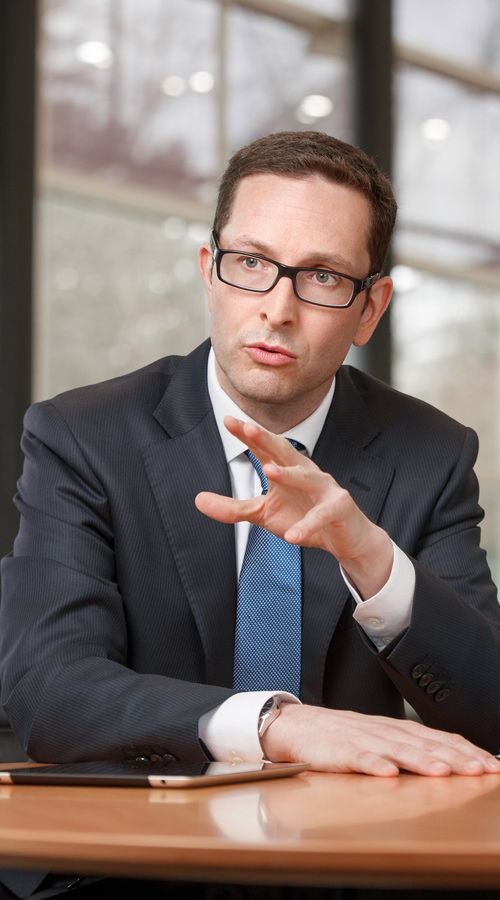Mario Mehren becomes spokesperson of the OAOEV’s Russia working group


- First meeting under his aegis on 1 November in Berlin
- Working group encourages increased cooperation in fields of the future
- The aim is a joint economic area from Lisbon to Vladivostok
Mario Mehren, Chairman and Chief Executive Officer (CEO) of the natural gas and crude oil company Wintershall Dea, is the new spokesperson of the Russia working group at the German Eastern Business Association (Ostausschuss – Osteuropaverein der Deutschen Wirtschaft, OAOEV). On 1 November, Mehren will chair his first meeting of the working group in Berlin in this capacity, thus redoubling his commitment to economic and policy cooperation with Russia: “We have to identify areas in which we can make progress. We should come together wherever our individual positions are not so far apart. Energy cooperation may be a good example in this regard.”
With a trading volume of €62 billion in 2018, Russia continues to rank among Germany’s major trading partners, although the latest figures are still significantly down on their peak of €80 billion in 2012. Another decline in the trading volume is expected for 2019: during the first eight months, German imports from Russia declined by around 10 percent, while German exports rose slightly by 2.2 percent. The reasons for the slow growth include Russia’s current lack of momentum for modernisation, its poorly developed SME sector, persistent backlog in the fight against corruption and, not least, the negative impact of mutual economic sanctions.
The tense relations between Moscow and Brussels are an incentive for Mehren to provide fresh impetus for dialogue through the working group. For example, he proposes the resumption of the energy dialogue with Russia, which was suspended by the EU in 2014: “It is in our interest, as Germans and Europeans, to restart the energy dialogue. Energy cooperation is a proven forerunner of rapprochement with Moscow”, argues Mehren. The first energy dialogue was held in 2001, providing a forum of trust for issues relating to the EU’s energy supply security, energy transport and potential environmental consequences.
In spring 2019, the OAOEV had presented a comprehensive position paper which defines 15 strategic subject areas where more extensive cooperation can be achieved between German and Russian companies despite existing sanctions. “Our objective is a positive vision, because there are many areas in which we are already cooperating with Russia extremely successfully and could achieve a whole lot more”, emphasises Oliver Hermes, Managing Director of the OAOEV. This includes safeguarding the energy and commodity supplies, the digitalisation of the economy, cooperation to increase agricultural output, or joint space projects. “We have to take a holistic approach to dealing with the challenges of German-Russian economic relations”, says Hermes. “Most crucially, this includes working on a guiding vision: a joint economic area stretching from Lisbon to Vladivostok, and thus cooperation between the EU and the Eurasian Economic Union.”
Other issues that the working group will discuss at its autumn meeting include the localisation policy of the Russian government, which has been vigorously pursued in response to economic sanctions. As a result, German companies have increasingly been forced to localise production in Russia in order to have a platform to compete with Russian companies at all, for example in invitations to tender.
The OAOEV Russia working group has a membership of around 50 companies. The autumn meeting will also be attended by representatives of the German Federal Ministry for Economic Affairs and the German Foreign Office.
About the OAOEV:
The German Eastern Business Association (“Ost-Ausschuss – Osteuropaverein der Deutschen Wirtschaft e.V.”, OAOEV) was established in May 2018 by merging two long-standing associations, the Eastern Committee (founded in 1952) and the Eastern Europe Business Association of Germany (founded in 1990); it promotes the interests of the German economy in 29 countries in Central, Eastern and South-Eastern Europe, in the South Caucasus and in Central Asia. Trade with these countries accounts for around one fifth of all German exports, making it more significant than trade with the USA or China. The OAOEV has around 350 member companies and associations and is supported by six leading associations of German industry: the Association of German Banks (Bankenverband), the Federation of German Wholesale, Foreign Trade and Services (BGA), the Federation of German Industries (BDI), the Association of German Chambers of Commerce and Industry (DIHK), the German Insurance Association (GDV) and the German Confederation of Skilled Crafts (ZDH).

